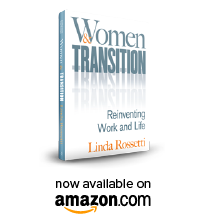I’ll never forget an interview I did for my book….. One afternoon a mid-forties woman who had three sons joined me for coffee in an artsy bakery in Pasadena, CA. She agreed to talk with me about her transition, triggered by an empty nest. Shortly after we began we unexpectedly turned our focus to an earlier transition, her decision to leave the workforce. She offered, “there was a lot of pressure on me to buy into the concept of being a full-time mother.” Her husband and her in-laws voiced strong opposition to her continuing to work. Financially she and her husband thought they could get by on one salary. Neither of her own parents were living. She said of her experience, “I was the guilty party for wanting to pursue my work. It was a particularly difficult time.”
That interview played over and over in my mind this week after reading, Claire Cain Miller’s Upshot column in the New York Times entitled, “More Than Their Mothers, Young Women Plan Career Pauses.” The notion of ‘plan’ as presented in the article is what really got me.
Here is where I struggle: Is the plan a women’s best attempt at working out a sub-optimal situation or is the plan something that genuinely represents a woman’s fullest expression of herself?
Cain Miller highlighted a variety of survey data all of which confirmed that it is still hard for women to work two generations after the 1970’s wave of the women’s movement. Plan?
Here are some other highlights:
- Over a twenty year period starting in 1992, there was a 36% drop in the number of female Wharton Business School grads who planned to have children. It went from 78% to 42%. “In some cases they did not want to, and in others they did not think they could make it work because of a lack of organizational support” said an administrator of Wharton’s work/life integration project. What does it mean if these incredibly talented women can not see a way through this morass?
- Declines were also recorded for women’s expectations about their work in comparison to their peers, their spouses. These responses were for women in general who both parented and worked: 66 percent of millennial women said they expected their careers to be equal to those of their spouses, compared with 79 percent of baby boomers.
- 37% of millennial women expected to interrupt their careers for children while 13 percent of millennial men said the same. That is more than the 4 percent of Generation X men and 3 percent of baby boomer men.
Transition has taught me to think about the article’s messages in two very specific camps.
The first camp focuses entirely on the personal work that women need to undertake when faced with the need to change in their lives. Many situations can trigger this need for change – like graduating from Wharton or deciding to parent. But so too – getting married or changing careers or encountering infertility issues or many, many others.
At these moments women need to decide if they’ll change or transition. If they choose transition, women begin a process of re-examining their assumptions about identity, capacity and values. This process yields a unique voice for each woman – one that can be represented by many of the vignettes used in Cain Miller’s piece.
The second camp I use to interpret articles like this one is through a lens educated on the environmental, social and cultural norms that greatly influence women’s choices. Examples of these norms are the inflexible workplace practices that still characterize the vast majority of our employers, the virtual lack of availability of part-time work or the mismatch between the workday and the school day – a structure better suited to support the households of the 1950’s.
My hope in reading articles like Cain Miller’s is that no one believes that the gender disadvantage that she highlights represents our heart’s greatest choice. How do I conclude that? If the second camp was characterized by options that supported women in their fullest expression – economic or otherwise – my suspicion is that our choices would be very very different.
Transition has taught me that voice is the one choice we cannot compromise. Even if you have only one hour on a Tuesday night once a month to work on it – develop your own voice. Its presence alone will determine the appropriateness of any compromise ahead for you.
Copyright © 2015 NovoFemina.com. All rights reserved. No content on this site may be reused in any fashion without written permission from NovoFemina.com.




